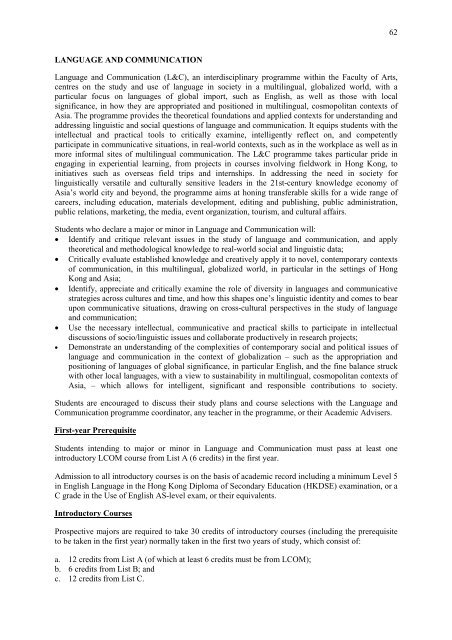(BA) (4-year-programme) - The University of Hong Kong
(BA) (4-year-programme) - The University of Hong Kong
(BA) (4-year-programme) - The University of Hong Kong
Create successful ePaper yourself
Turn your PDF publications into a flip-book with our unique Google optimized e-Paper software.
62LANGUAGE AND COMMUNICATIONLanguage and Communication (L&C), an interdisciplinary <strong>programme</strong> within the Faculty <strong>of</strong> Arts,centres on the study and use <strong>of</strong> language in society in a multilingual, globalized world, with aparticular focus on languages <strong>of</strong> global import, such as English, as well as those with localsignificance, in how they are appropriated and positioned in multilingual, cosmopolitan contexts <strong>of</strong>Asia. <strong>The</strong> <strong>programme</strong> provides the theoretical foundations and applied contexts for understanding andaddressing linguistic and social questions <strong>of</strong> language and communication. It equips students with theintellectual and practical tools to critically examine, intelligently reflect on, and competentlyparticipate in communicative situations, in real-world contexts, such as in the workplace as well as inmore informal sites <strong>of</strong> multilingual communication. <strong>The</strong> L&C <strong>programme</strong> takes particular pride inengaging in experiential learning, from projects in courses involving fieldwork in <strong>Hong</strong> <strong>Kong</strong>, toinitiatives such as overseas field trips and internships. In addressing the need in society forlinguistically versatile and culturally sensitive leaders in the 21st-century knowledge economy <strong>of</strong>Asia’s world city and beyond, the <strong>programme</strong> aims at honing transferable skills for a wide range <strong>of</strong>careers, including education, materials development, editing and publishing, public administration,public relations, marketing, the media, event organization, tourism, and cultural affairs.Students who declare a major or minor in Language and Communication will:• Identify and critique relevant issues in the study <strong>of</strong> language and communication, and applytheoretical and methodological knowledge to real-world social and linguistic data;• Critically evaluate established knowledge and creatively apply it to novel, contemporary contexts<strong>of</strong> communication, in this multilingual, globalized world, in particular in the settings <strong>of</strong> <strong>Hong</strong><strong>Kong</strong> and Asia;• Identify, appreciate and critically examine the role <strong>of</strong> diversity in languages and communicativestrategies across cultures and time, and how this shapes one’s linguistic identity and comes to bearupon communicative situations, drawing on cross-cultural perspectives in the study <strong>of</strong> languageand communication;• Use the necessary intellectual, communicative and practical skills to participate in intellectualdiscussions <strong>of</strong> socio/linguistic issues and collaborate productively in research projects;• Demonstrate an understanding <strong>of</strong> the complexities <strong>of</strong> contemporary social and political issues <strong>of</strong>language and communication in the context <strong>of</strong> globalization – such as the appropriation andpositioning <strong>of</strong> languages <strong>of</strong> global significance, in particular English, and the fine balance struckwith other local languages, with a view to sustainability in multilingual, cosmopolitan contexts <strong>of</strong>Asia, – which allows for intelligent, significant and responsible contributions to society.Students are encouraged to discuss their study plans and course selections with the Language andCommunication <strong>programme</strong> coordinator, any teacher in the <strong>programme</strong>, or their Academic Advisers.First-<strong>year</strong> PrerequisiteStudents intending to major or minor in Language and Communication must pass at least oneintroductory LCOM course from List A (6 credits) in the first <strong>year</strong>.Admission to all introductory courses is on the basis <strong>of</strong> academic record including a minimum Level 5in English Language in the <strong>Hong</strong> <strong>Kong</strong> Diploma <strong>of</strong> Secondary Education (HKDSE) examination, or aC grade in the Use <strong>of</strong> English AS-level exam, or their equivalents.Introductory CoursesProspective majors are required to take 30 credits <strong>of</strong> introductory courses (including the prerequisiteto be taken in the first <strong>year</strong>) normally taken in the first two <strong>year</strong>s <strong>of</strong> study, which consist <strong>of</strong>:a. 12 credits from List A (<strong>of</strong> which at least 6 credits must be from LCOM);b. 6 credits from List B; andc. 12 credits from List C.
















